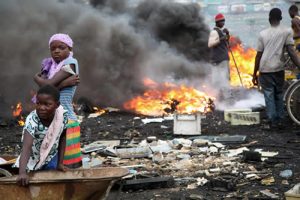Air pollution is the leading environmental risk factor in Ghana that contributes to most deaths and disabilities, according to the Institute for Health Metrics and Evaluation (IHME), yet it receives little political or public attention in comparison to other issues.

Public attention given to traffic accidents on a particular road as compared to fumes coming from the exhaust pipe of a minibus (trotro) differs significantly as though the latter has no impact whatsoever on citizens. It is vital to increase awareness of the problem of air pollution in Ghana and emphasise why it should be a political issue for the elections in 2024.
Experts and researchers agree that the most harmful airborne pollutant is Particulate Matter 2.5 (PM2.5). This is the most harmful to human health and the most difficult to prevent from entering the body due to the size of particles. Data from Kaneshie in Accra consistently reports PM2.5 levels that considered unhealthy for all citizens (5th September 2023 PM2.5 155 μg/m3), 10 times higher than the World Health Organisation 24-hour average exposure guidelines of 15 μg/m3.
Ghana’s health and economy suffer because of air pollution. Nearly 24,000 Ghanaians die prematurely each year due to poor air quality. Childhood exposure to air pollution has been linked to mental health issues in adulthood, specifically decline in cognitive ability and schizophrenia. More commonly, exposure is associated with various respiratory problems from birth and infancy to school age and into adulthood as reported by the Royal College of Paediatrics and Child Health (RCPCH). Economically, air pollution cost Ghana an estimated 1.6 billion U.S. dollars in economic loss in 2019.
Despite the economic and health implications of this issue, it can hardly be found on the political agenda, in discussions of development in Ghana, in the demands of the citizens or in government policies. Why is that? The unseen effects of air pollution make it hard for people to be fazed by it. For a country like Ghana with limited systems to monitor and gather air quality data in real time, it is hard to assess the scale of this ticking time bomb.
In Ghana, most people are regularly exposed to both indoor and outdoor sources of air pollution. Pollution from solid fuels such as wood and charcoal used for cooking and heating homes, waste management practises such as burning garbage and vehicle tyres, vehicular emissions, and dust from unpaved roads are prominent sources. These sources can be managed, but there is limited action being taken to deliver air quality improvement.
In 2019, air pollution was responsible for more than half of the 1.1 million premature deaths in Africa. Vulnerable people, such as the elderly, those with pre-existing medical conditions, mothers, and children who spend most of their time at home, are often exposed to airborne pollutants associated with the use of solid fuels. In terms of outdoor air pollution, most vehicles on Ghana’s roads are older and more polluting models and many roads are unpaved with both contributing to poor air quality in urban areas. This poor air quality affects those who spend significant times at roadside locations – from commuters to traffic police as well as hawkers and street food sellers plying their trade at the roadside.
Collection of air quality data is a major factor contributing to the invisibility air pollution’s impact. The monitoring network does not cover many locations, making it difficult to accurately gauge the magnitude of air pollution throughout the country. However, as stated by Dr Collins Gameli Hodoli, “even if there is limited data for Ghana to use as evidence, there are enough estimations for Africa and the rest of the globe to highlight the potential scale of the challenge thereby warranting immediate attention and reactions”.
Similarly, the rate of premature deaths in women and children, the rise in respiratory infections and the exacerbation of asthma attacks among the Ghanaian population are often left unexplained due to limited health surveillance data or site-specific air pollution data.
Air pollution is not on the political agenda for the 2024 elections. Several economic, social, and political reasons undermine efforts to raise awareness of air pollution, including the cost of changes needed to address sources of air pollution for both policy makers and citizens. Furthermore, other pressing matters like unemployment, access to quality education and cost of living monopolise citizens’ attention – resulting in the topic being pushed to the bottom of the priority list.
Finally, the effects of air pollution are not visible, and it takes a long time for the cumulative effects of exposure to manifest. All these factors reinforce the perception that air pollution is not a serious topic of conversation in Ghana and the issue does not yield enough political capital. Current political systems and activities – clientelism, corruption and weaponization of votes – undermine the efforts of advocates.
We must form a coalition of change agents, including academics, the media, policymakers, the Environmental Protection Agency (EPA), and citizens, for there to be meaningful improvement in Ghana’s air quality. Regarding perceived opposition to the cost of change, there must be a youth-focused curriculum at elementary school level to help accelerate the shift, even if adults are averse to change. In addition, as suggested by Miss Victoria Owusu Tawiah from Clean Air Fund Ghana, air quality and health researchers should be mandated to share their research with policy makers to ensure that evidence-informed decision making can take place.
Only strong environmental and social policies that consider scientific data and routinely evaluate standards using site-specific, convincing evidence will allow our nation to make progress. To end on a more positive note, activities and policy implementations related to air pollution have been rolled, including the establishment of the Citizens’ Bureau by the Parliament of Ghana. However, given the seriousness of the consequences of air pollution, all change agents and stakeholders must do more.
By Sharon Boadu, a Ghanaian student undertaking a MsC in Development Policy and Politics at the University of Birmingham
